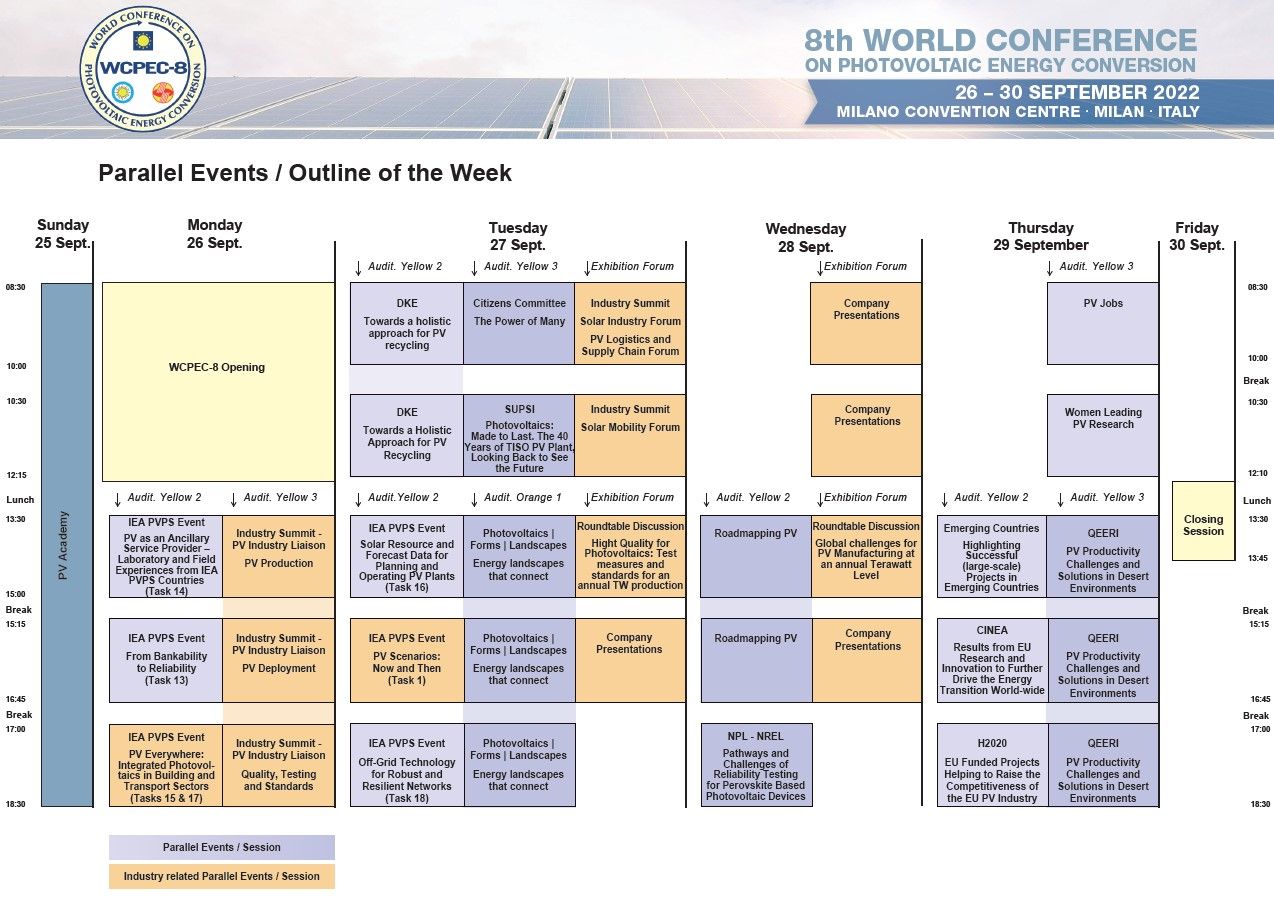Industry Summit Programme
A stage for industry players to present their businesses, but also to share and discuss new developments in the industrial sector with fellow experts.
PV Everywhere: Integrated Photovoltaics in Building and Transport Sectors (IEA PVPS Task 15 & Task 17)
17:00 – 18:30
IEA PVPS Tasks are working to accelerate the penetration of integrated PV in buildings and transport systems, which are both critical sectors for the global renewable energy market. Task 15 will present recent results on Technological Innovation System for BIPV in different countries and cross sectional analysis based on well-defined multifunctional evaluation of BIPV to facilitate and support the implementation of BIPV in buildings. Task 17 will present recent scientific results on vehicle-integrated PV and PV charging station infrastructure focusing on requirements, barriers, benefits and solutions to increase PV contribution to energy and environmental issues.
Industry Summit
PV Production
13:30 - 15:00
What are the real costs of PV? How much local PV production is needed? How fast can we set up xGW of necessary production in the EU? These are of the most important questions asked by European Commission to achieve independence from energy imports in the future. This session will target these important questions, including the stimulations required of the entire value chain starting with poly-Si. In addition, possible funding schemes and additional incentives for PV production will be summarized and discussed.PV Deployment
15:15 - 16:45
What are the challenges for multi-TW deployment? Why are energy yields overestimated in the newest PV systems? What are the lessons learned from the last years of installations? The recent, ironically called, “Peter PAN files” are gaining some negative attention, due to being one of the reasons for systems yield overestimations. Additionally, degrading modules and inaccurate bifacial simulations programs are adding to this problem. This session will give a review as to where we are and what will be needed for a smooth PV deployment.Quality, Testing and Standards
17:00 - 18:30
In order to enter a sustainable TW PV era quality, testing, and standards are key. What to do in order to make sure that we do not end up with 1 TW of modules to recall? And if we have to recall, where are the modules? How much does our scientific knowledge about reliability of PV components have to improve? Better reliability modelling? Do next-tech n-type technologies lead to new degradation mechanisms we need to identify and control? These are all critical questions that we need to tackle today in order to be able to answer them in the coming years.Roundtable Discussion:
Hight Quality for Photovoltaics: Test measures and standards for an annual TW production.
13:30 – 15:00
The solar industry will reach 1TW annual production within the next years. Which measures are required to achieve economies of scale in inspection and metrology? Do we need updated standards, will machine learning become a standard method, will we use more machines for inline quality checks?
Moderator: Torsten Brammer (Wavelabs)
PV Scenarios: now and then (IEA PVPS Task 1)
15:15 – 16:45
Forecasting the development of PV has always been a balancing act between realism and optimism. From the beginning of its deployment, PV scenarios and forecasts have significantly underestimated PV development, with sound arguments. This event will browse through some past scenarios comparing them with actual PV market trajectories, and build on these past experiences to consider what awaits the sector going forward. With PV having reached 1 TW of total installed capacity this year and being poised to cross the 200 GW mark of annual installations in 2022, it is time to reflect on the mistakes from the past and embrace optimism towards the TW-era.
Industry Summit
Solar Industry Forum: Logistics and Supply Chain
08:30 - 10:00
Supply chain and logistic issues affecting PV manufacturing
The key to the next stage of solar market development is to improve efficiencies and lower costs across the solar supply chain to create a sustainable revenue stream. This Parallel Event promotes greater collaboration in the supply chain amongst the PV manufacturers, suppliers, distributors, and installers of Solar modules.
For this session we have confirmed
- Bryan Ekus, from Solar United for the introduction and moderation
- Daniel Mugnier to present the latest IEA report on the supply chain for PV
- Christian Westermeier, from Wacker Polysilicon, “A Strategic Supplier to a Sustainable EU PV Supply Chain”
Solar Mobility Forum
10:30 - 12:00
Solar mobility becomes a reality with the need for EVs to be powered by renewable electricity. But this is only the tip of the iceberg since PV-powered cars are being developed, and solar produced green hydrogen is increasingly announced as a promising energy vector for the decarbonization of transport.
- Nabih Cherradi for the moderation
- Philippe Macé, Becquerel Institute will be giving a keynote “E-mobility sector: status, perspectives and opportunities”
- Heinz Ossenbrink will present the latest mobility products including VIPV
- Guillaume Courtois, Umicore will be talking about circular economy and material recycling
Roundtable Discussion:
Global challenges for PV Manufacturing at an annual Terawatt Level
13:30 – 15:00
What specific hurdles do companies face in the PV production, and how to deal with them? This session will focus on the perspective of important representatives of the PV industry and their needs.
Moderator: Radovan Kopecek (ISC Konstanz)
What to expect:
The programme of the Industry Summit is constantly being expanded and enriched. You can look forward to the following topics:
- PV Deployment
- Quality, Testing and Standards
- PV Production
- PV Scenarios
- PV Everywhere
- Solar Industry Forum
- Solar Mobility Forum
- Specific PV Products Presentations
More detailed information will follow soon.
